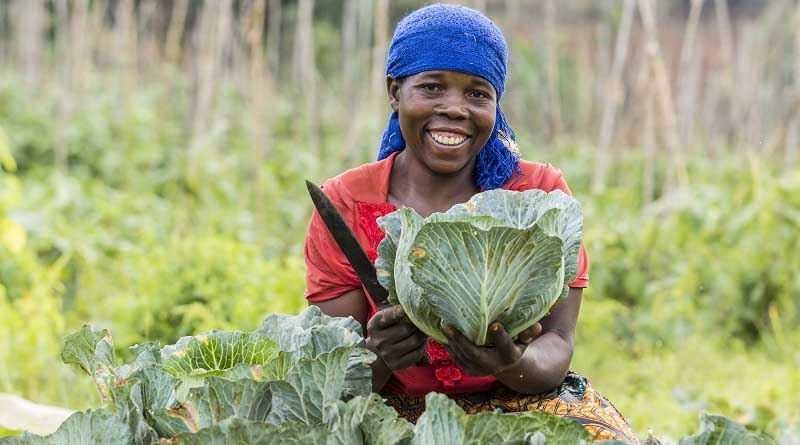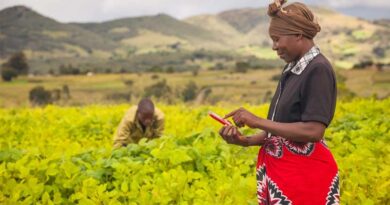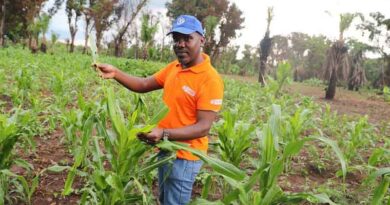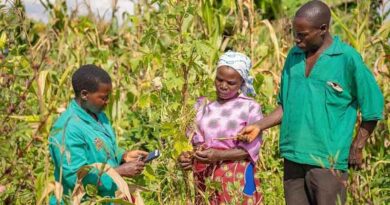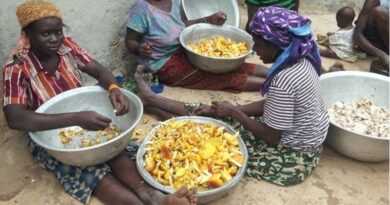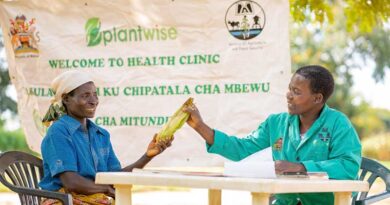Reflections on COP 28: Conference brought food and farmers to the forefront of climate change negotiations
20 February 2024, Africa: After two weeks of discussions, the COP 28 UAE Presidency brought the curtain down on this major event. Dr Lydiah Gatere, CABI’s Climate Change Expert, Africa, attended and took part in a panel discussion – hosted by the Standards and Trade Development Facility (STDF) – which focused on why stronger Sanitary and Phytosanitary Systems matter for greater climate resilience. Srijita Dasgupta, CABI’s Climate Change Expert, Asia, was also at the conference and helped to showcase CABI’s work on climate change, pests, and invasive species management at the country pavilions of Thailand and Vietnam.
For the first time, food and farmers were a major part of climate change negotiations. Ms Dasgupta reviews the highlights in this blog post.
The declaration on sustainable agriculture, resilient food systems and climate action, signed during COP28, demonstrates a strong commitment from 159 countries to transforming agrifood systems and to adapting to a rapidly changing climate. It also declares an intention to tackle hunger and poverty, and conserve biodiversity.
The agreement is a significant achievement. It acknowledges the crucial role of food systems in emission reduction efforts and the urgent need to support smallholder farmers, who are central to this transformation process and help keep food on our plates.
Food systems are responsible for almost one third of all global greenhouse gas emissions. They are also responsible for around 80% of biodiversity loss. Furthermore, they consume 70% of our freshwater.
Climate change is causing catastrophic impacts to food security and socio-economic conditions. This is particularly the case in African and Asian countries. Acknowledging these challenges, food systems were formally incorporated at a COP event for the very first time.
An entire day was dedicated to the theme of Food and Agriculture. The event brought together relevant stakeholders to discuss the need for meaningful climate actions.
Breakthrough decisions from COP 28 on agriculture and food systems
The Emirates Declaration on Sustainable Agriculture, Resilient Food Systems and Climate Action was signed on the second day of COP. The agreement was possibly the most significant outcome of the event. This was demonstrated by the high number of signatories. Almost 80% of Parties to the United Nations Framework Convention on Climate Change (UNFCCC) signed the declaration.
Country leaders and dignitaries are now committed to reforming national policies and frameworks to transform food systems. And they acknowledge the impacts that climate change is having on sustainable development.
Additionally, by ratifying this declaration, countries will now include food and water in their targets. These include system-based targets, outcomes and indicators. And they will be included in the next round of revisions of the Nationally Determined Contributions (NDCs) and National Adaptation Plans (NAPs).
However, no concrete outcomes were reached under the Sharm El Sheikh Joint Work on Implementation of Climate Action on Agriculture and Food Security. This was a major disappointment for the agriculture negotiators. Nonetheless, the Food and Agriculture Organization (FAO), CGIAR, World Bank and International Fund for Agriculture Development (IFAD) jointly launched the three-year Sharm-El Sheikh Support Programme. This initiative will help countries unlock finance and support for farmers, food producers, small agribusinesses, and local communities.
The FAO, meanwhile, launched its roadmap to achieve SDG 2 without breaching the 1.5 °C threshold. It takes a multifaceted and multi-stakeholder approach. And it outlines the need to implement sustainable and climate-smart agricultural practices. By empowering smallholder farmers, the roadmap seeks to enhance food security. At the same time, it promotes biodiversity conservation. And it mitigates climate change impacts through innovative technologies and policy frameworks.
Another positive outcome was the launch of the Alliance of Champions for Food System Transformation. Brazil, Cambodia, Norway, Rwanda, and Sierra Leone launched this initiative. The aim is to drive the required systemic transformation of agrifood systems.
The Global Goal on Adaptation also set out further targets for 2030. These focus on the development of “climate-resilient food and agricultural production, supply and distribution of food.”
In addition, the Action Agenda on Regenerative Landscapes was launched. This agreement urges food value chain players, financiers, local governments, and other stakeholders to work together. It calls for them to collaboratively apply regenerative practices and prioritize the environment. The initiative concentrates on conservation, restoration, and enhancement of ecosystem functions.
A number of financial commitments were also made at COP to support agrifood system transformation. The most notable was towards CGIAR’s continued pioneering work on accelerating innovations for the agriculture sectors.
The UAE and the US governments have also doubled their investments for ‘transformative climate-smart agriculture and innovations’. They will achieve this through the Agriculture Innovation Mission for Climate (AIM4Climate) Initiative.
The road ahead
Countries are now clear on their intent to transform their agrifood systems. They have included ambitious goals and targets for the agricultural sectors in their NDCs and NAPs. By doing this, they have highlighted the urgent need to transform agriculture. Their goal is to address both climate and development challenges. Implementation of climate-smart agricultural and integrated land management practices can reap rewards. They can help countries decrease emissions from agriculture while also enhancing resilience to climate change. And they can achieve this without compromising productivity.
Inclusive and locally led adaptation measures are valuable. They empower smallholder farmers to build resilience and produce more from less. However, a lot still needs to be done. Declarations and events are not the ultimate outcome. More collaborative effort is needed to build on this momentum. The work can accelerate progress in the lead up to the COP 29 which will take place in Azerbaijan from 11 to 24 November 2024.
CABI’s commitment to smallholder farmers
CABI is strongly committed to helping smallholder farmers adapt to the changing climate. CABI’s Medium Term Strategy (MTS) 2023-2025 sets out ambitious targets. CABI aims to help solve some of the biggest challenges facing humanity – hunger, poverty, gender inequality, climate change and loss of biodiversity. But the MTS cannot be achieved without concrete actions on climate change itself. This is due to the catalytic and cross cutting nature of this global challenge.
CABI’s expertise can help to deliver solutions. The organization focuses on nature-based solutions, plant health, climate-smart pest management and invasive species management. And through its wide portfolio of research based and practical programmes, it can play a vital role helping countries to achieve their climate and development goals.
Placing smallholder farmers at the heart of any intervention is crucial. The global PlantwisePlus programme, for example, puts farmers front and centre of plant health knowledge. Through the programme, CABI is well placed to be an effective interface for countries. It can help to put science into policy and practice. Most importantly, it can help with adaptation to and mitigation of the impacts of a rapidly changing climate.
CABI is committed to continue supporting smallholder farmers. Projects and programmes aim to deliver climate-smart approaches, practices, and digital information tools. And critically, they can support enhanced use of biological controls for sustainable transformation of the agrifood systems.
Also Read: Banana exports from India to touch US$ 1 Billion: APEDA
(For Latest Agriculture News & Updates, follow Krishak Jagat on Google News)

